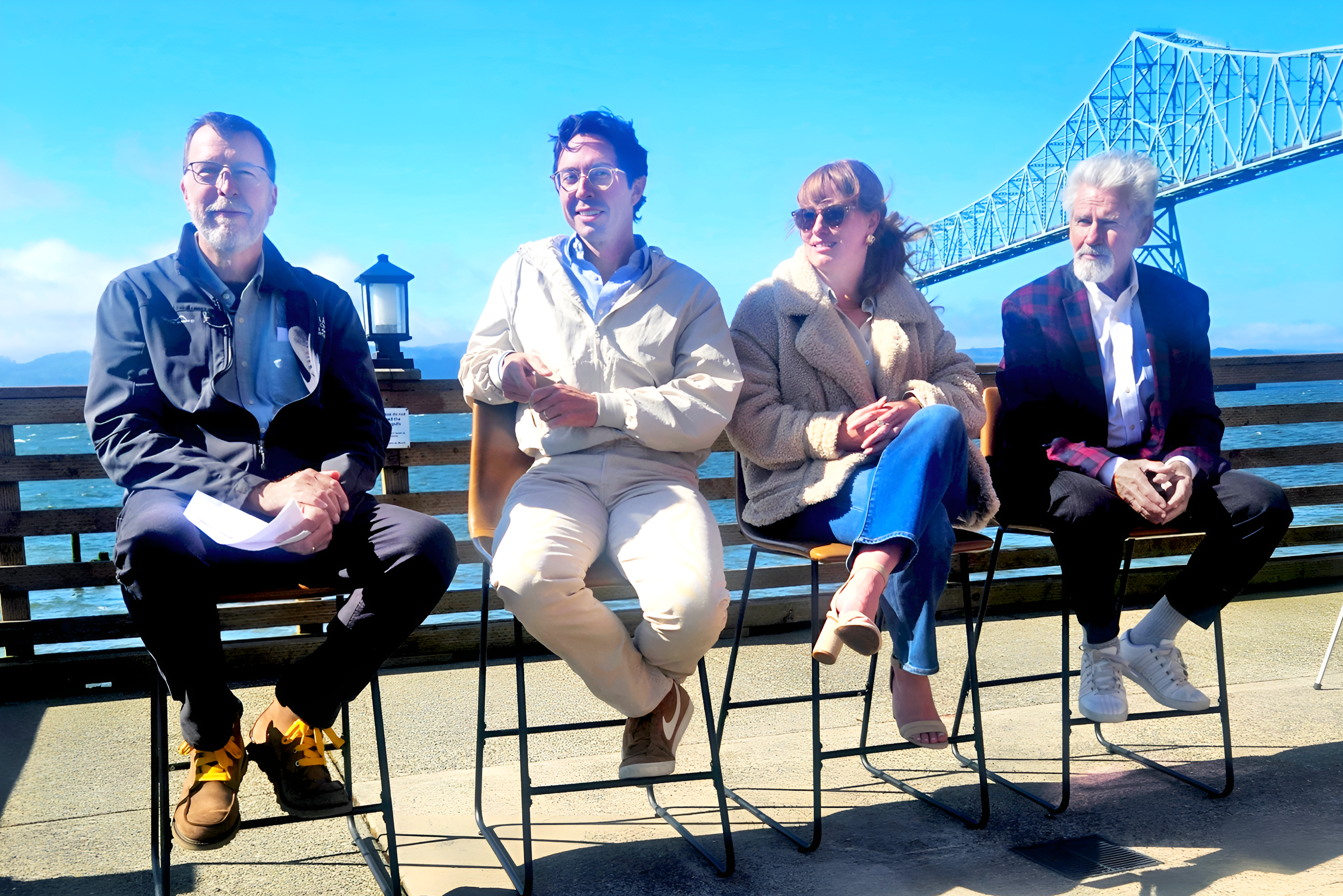More than a dozen candidates attend forum
Published 12:19 pm Wednesday, April 16, 2025



More than a dozen candidates weighed in at a forum at Astoria High School on Tuesday night, addressing topics ranging from funding to leadership.
The forum, hosted by the American Association of University Women Astoria chapter and moderated by Astoria High School Principal Lynn Jackson, featured audience-submitted questions for candidates of the Astoria School Board, Port of Astoria Commission, Clatsop Community College board and Sunset Empire Transportation district board. They are running in the May 20 election.
Astoria School Board
Budget priorities, student success and diversity, equity and inclusion were among the key topics dominating a panel of candidates running for the Astoria School Board’s Position 4 — the only contested race in the district’s elections.
Four candidates — all parents of students in the district — are running for the position: Tyler Lyngstad, Karl Hellberg, Susan Prettyman Hartill and Holly Marsh. Lyngstad, recreation manager for the city of Astoria, highlighted his previous experience in the district, including as a sports coach and ninth-grade on-track coach. Hellberg, a private investigator who spent decades with the U.S. Coast Guard, also has served on the district budget committee and strategic planning committee. Prettyman Hartill, the deputy director of The Harbor, brings a background in social services that she said has informed her work advocating for vulnerable families as vice chair of the district’s budget committee.
Marsh, a small-business owner, emphasized her experience as a neurodivergent parent with neurodivergent children.
“I’ve had my fair share of 504 and IEP meetings, and while my experience has been wonderful with my district, I know that that’s not the case for every parent, and it makes me think about who’s missing from the table when discussions and decisions are being made,” she said.
During the panel, candidates often found themselves in agreement with one another. Several identified budgetary shortfalls as a hurdle for the district.
When working through a budget, Lyngstad said his priorities would be addressing declining enrollment, optimizing school transportation and looking at the potential for school-building consolidation, including whether it makes sense to have district staff remain at the Capt. Robert Gray school, where the district office is located. Hellberg emphasized education as a priority, highlighting struggling reading and math proficiency levels. Prettyman Hartill and Marsh echoed similar sentiments, noting their desire to avoid personnel cuts and to support educators. Candidates also agreed that the school board should play a role in setting policy and supporting district efforts to increase attendance, although the responsibility of making sure students attend school ultimately falls to parents.
“We need to provide families with resources,” Lyngstad said. “People may need to go knock on doors, and we may need to call parents, and we may need to email parents. And a lot of the teachers that we have, they don’t have the time during their day to do that.”
Prettyman Hartill added that she thinks the school board has a responsibility to find creative ways to make sure students want to come to school — especially those who may be coming from challenging home situations or facing issues like homelessness.
Candidates also emphasized the importance of the district’s mission around diversity, equity and inclusion and of teaching civics.
“I think it’s also crucial when we’re talking about DEI to talk about the element of justice that gets left out,” Prettyman Hartill said. “And to me, I guess equity in education just genuinely means giving every student the tools and opportunities that they need to succeed, and I think that starts with a trauma-informed approach.”
Lyngstad said he’s committed to listening to community concerns and teaching historical accuracy, while Marsh described diversity, equity and inclusion as “vital.” Hellberg said he sees civics as an important part of teaching students how to be critical thinkers, adding that educational opportunities should include everyone.
“There’s no bigger equity lens that we could shine on any of our children than providing a solid education that actually provides the civics to understand our form of government and the great thinkers of this world,” Hellberg said.
On another hot-button issue — book bans — candidates also found common ground, agreeing on the need to fight censorship while also listening carefully to parent concerns and working with librarians and other experts to find appropriate reading options to meet curriculum standards.
Incumbents Jenna Rickenbach and Grace Laman are running unopposed for two other seats on the board.
Port Commission
Port of Astoria Commission candidates also shared priorities at Tuesday’s forum. This election, six candidates are vying for three open seats.
In Position 2, incumbent Dirk Rohne, a Brownsmead-based dairy farmer, is facing Thomas Jenkins, a regional coordinator for the Oregon Department of Emergency Management. In Position 5, commercial pilot and flight instructor Thaddeus Fickel is running against Rob Seitz, a local restaurant owner with 30 years of experience as a commercial fisherman. In Position 1, incumbent James Campbell is facing former Astoria city councilor Thomas Brownson. Campbell was unable to attend the forum.
Across the board, candidates seemed to agree on a common priority: repairs to Pier 2, which is home to Bornstein Seafoods and Da Yang Seafood.
“If the port had 20 priorities here, Pier 2 would be one through 19,” Rohne said.
For years, the pier has faced structural problems due to a failing seawall and rotting decks. In 2023, the port received a $25 million federal grant to support its rehabilitation. Pier 2 is also the site for a proposed byproduct recovery center that would help treat seafood processors’ wastewater in a single location — part of an effort to help businesses meet new permit requirements from the Oregon Department of Environmental Quality.
Although federal funding for the project is still secure, some concerns still remain over the future of the grant under the Trump administration.
“We have to do everything we can to protect that and make sure that it stays up. Because without that $25 million, Pier 2 does not get repaired,” Brownson said. “If it does not get repaired, we lose the fishing industry that we have. If Da Yang is gone, Bornstein is gone, it would be a serious blow to the economy of Clatsop County.”
Another priority for the port is a waterfront redevelopment project near the West Mooring Basin – part of the agency’s waterfront master plan created in collaboration with the city of Astoria. The Port Commission recently reviewed a proposal from developers that would include the demolition of the Astoria Riverwalk Inn and the addition of two new hotels, new restaurants and a market hall.
Candidates were broadly supportive of the waterfront redevelopment plan, although some raised specific questions. As new amenities potentially draw additional cruise ship passengers, Fickel expressed that he wants to be sure they continue to be funnelled to downtown. He also wants to ensure that the city has a sufficient water supply to support the project.
Seitz, who is the president of the Astoria Fisherman’s Cooperative, said the organization originally also submitted an expression of interest for the waterfront redevelopment. To him, it’s important that the port’s infrastructure continue to serve commercial fishermen.
“It’s obvious that if commercial fishing and tourism go head to head, that commercial fishing loses every time, so that’s why I feel like it’s important that we protect our working waterfront,” Seitz said. “We need to make sure that fish landings can continue happening because you can have a hotel anywhere, but you can only deliver fish one place.”
Other common priorities included expanded capacity at the port’s shipyard, the revitalization of the East Mooring Basin and work on the airport master plan. Brownson also said he wants to explore opportunities for Pier 1 beyond cargo.
Jenkins stressed a desire for community collaboration.
“If elected, I promise I will be just as accessible as I am tonight,” he said. “I won’t wait for you to come to the board to understand what’s going on. I will find you where you are on your time, on my dime, and let you know how we’re working for you.”
Clatsop Community College
Questions on funding, enrollment and diversity, equity and inclusion made up much of the panel between two Clatsop Community College board candidates.
For Zone 2, Position 2 — the board’s only contested position — Mitra Vazeen is running against Morgan Bates. Vazeen, who has been on the board since 2023, has overseen multiple Job Corps centers, including at Tongue Point, and has also worked as an adjunct professor at the college and served on its budget committee. Bates is a current student set to graduate this spring, serving as treasurer of the associated student government.
“I’m ready to bring a fresh student focused perspective,” Bates said. “I’m going to lead with integrity. People know me as someone who follows through on the things I say I’m going to do. I also intend to bring stability and focus to this position. I believe the board should be focused on what is most important: student success.”
Both candidates voiced support for diversity, equity and inclusion efforts, Vazeen highlighting her experience as a diversity trainer and intercultural awareness teacher. When it comes to increasing enrollment, Vazeen said she’d like to support the college in bringing creativity and flexibility to course offerings and forging partnerships with local businesses. Bates said she’d like to support staff and model collaboration and integrity for students.
As many postsecondary institutions face uncertainties over federal funding, Bates said she thinks the college should focus on other sources of funding that make up a larger portion of the college’s budget, including state appropriations, tuition and property taxes. Vazeen noted the successes of the college foundation board, pointing to opportunities to solicit new donors.
Bates conceded her time on a question about improving the implementation of the college’s strategic plan. Vazeen said she believes successful implementation starts with making sure all staff understand what the strategic plan is and their role in it.
“Writing plans are easy. Implementation is what it takes, and it takes a village. It’s not the president that’s going to do it. It’s not the Board of Education. It takes everybody,” she said. “We want to be student-centered.”
Current board members Ashley Flukinger and Sheila Roley are running unopposed for two other positions on the board.
Transportation district
Two candidates are vying for a commissioner position on the Sunset Empire Transportation District board.
Kathy Kleczek, a land use and transportation planner with the state and a former board member and chair for the district, is challenging incumbent Charles Withers for Position 3 on the board. Withers, a Cannon Beach resident who moved to Clatsop County from Virginia to retire, emphasized his experience as an incumbent member of the board as well as a lifelong interest in public transportation.
The race comes two years after the district’s financial collapse; in April 2023, the district suspended operations after its Executive Director Jeff Hazen announced it had run out of money. Had he not resigned the following month, the district’s board said Hazen would have been terminated for financial malfeasance that resulted in the district’s financial collapse.
At the same time, the board is nearing the end of a search for a new executive director to replace Craig Johnston, who was hired for the interim position in November 2023 to help steer the district out of financial difficulty and remained in the role for a year before resigning. The board interviewed candidates on Monday.
When asked about ridership levels, candidates differed on their answers; Withers said levels were currently at a little less than half of what they had been before the pandemic, but the district’s goal has been to bring the bus system back in a slower, more thoughtful manner.
Kleczek responded that there is no consistent and regular measurement of ridership used by district employees, but the district often uses a hand counting method to count how many people ride the bus.
“That is not the most critical number,” she said. “It’s ‘How many people are we serving?’ ‘What communities are we serving?’ And ‘how can we best improve service to those people that are furthest out and have the hardest time getting transportation to where they need to go?’”
Candidates were asked how they would establish financial security in the district, especially in the face of potential funding cuts.
“Most of you know that our funding comes from government sources … We have a good reputation with the state now that we’ve solved our problems and fixed some of the things that were intrinsic in the system,” Withers said.
Seaside City Councilor Tita Montero, incumbent Pam Alegria and Paul Lewicki, who served on the board from 2011 to 2016, are all running unopposed for other positions on the board.
This story has been corrected. An earlier version incorrectly said Tyler Lyngstad saw potential in consolidating two elementary schools.
An earlier version also misstated Kathy Kleczek’s occupation.
The Astorian regrets these errors.









